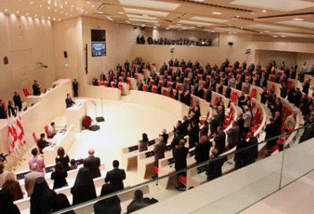Shorena Kakabadze, Kutaisi
Bidzina Giorgobiani, Irakli Orkuashvili, Mikheil Kareli, Badri Bitsadze, Kibar Khalvashi – this is incomplete list of people, who received status of politically persecuted persons on November 19 at the session of Human Rights Committee of the Parliament of Georgia after noisy debates.
Special working group worked on the list of 180 people, on the cases of alleged politically persecuted persons and political prisoners during two weeks. The group members are representatives of human rights organizations. Their final conclusions were presented at the Human Rights Committee’s session in a very controversial environment.
According to the clarification of the current authority, these people shall be discharged and they should be able to return to Georgia and continue peaceful life in the homeland with restituted rights.
“Dangerous Syndrome,” it was evaluation of the parliamentary minority at the session. “Current authority tries to grant status of either politically persecuted person or political prisoner, to criminals. It is list of their close people (relatives, friends, co-thinker, party-member, etc) whom the governmental representatives recalled so far and now they intend to grant status of politically persecuted people to them. These people have committed grave and particularly grave crimes, including espionage,” said MP Davit Sakvarelidze.
“Every person, nominated by the working group, was politically persecuted. We do not discuss legal side of these cases; we do not discuss committed crimes. We just discuss political motives – whether these people were arrested or compelled to flee from the country as a result of political revenge. Considering these circumstances we believe that every person, who was mentioned here, was subject of political persecution,” member of the working group, head of nongovernmental organization Former Political Prisoners for Human Rights Nana Kakabadze replied to the parliamentary minority.
Human Rights Committee held its first session on November 1 on the topic of political prisoners. Representatives of human rights organizations, experts and family members of political prisoners also attended the session; participants said that Committee will use criteria set by the Parliamentary Assembly of Council of Europe when granting status of politically persecuted to people.
According to this document, a person is a political prisoner if he was detained through violation of the fundamental rights and freedoms guaranteed by the European Convention on Human Rights and its protocols; or if a person was arrested only on political grounds without committing any concrete criminal offence; if the detention was result of clearly unfair trial and political motives of the government are observed in it; if political motives, punishment terms or conditions are irrelevant to the crime committed by the accused.
Ucha Nanuashvili, member of the working group and executive director of Human Rights Center: “We worked based on the criteria of PACE. We discussed each case and made relevant decisions. Military servants, who were arrested in relation with Mukhrovani case, received status of a political prisoner. Also, people who were arrested during and after May 26, 2011. It is historical day. I think years-long process finished fairly. Human Rights Committee of the Parliament considered recommendations of human rights organizations including Human Rights Center and declared these people political prisoners and politically persecuted people. It is very important. The main point is to make decision on granting status of a political prisoner. However, there are cases where valid evidence was not provided and working group will submit them to the Human Rights Committee for the next session. Consequently, it is not excluded that other people will also be added to this list.”
Working group will continue working on cases next two weeks and will send relevant recommendations to the Human Rights Committee on them. The latter will work out special resolution on political prisoners which will be raised at the first session of the Parliament of Georgia.




